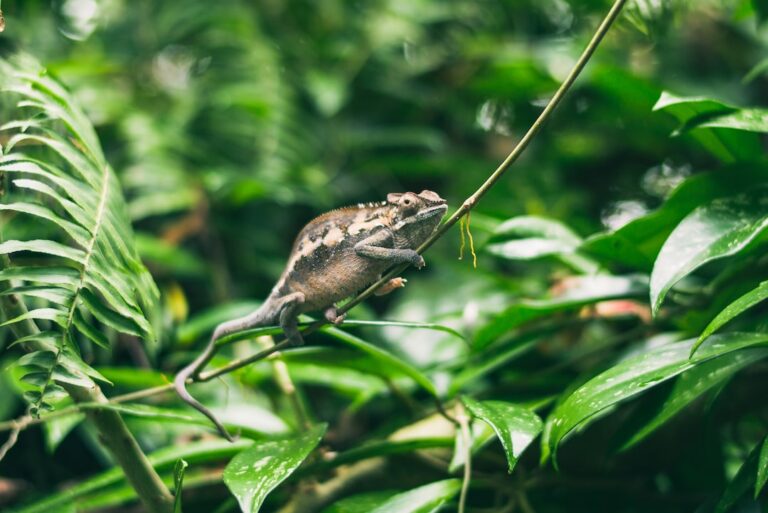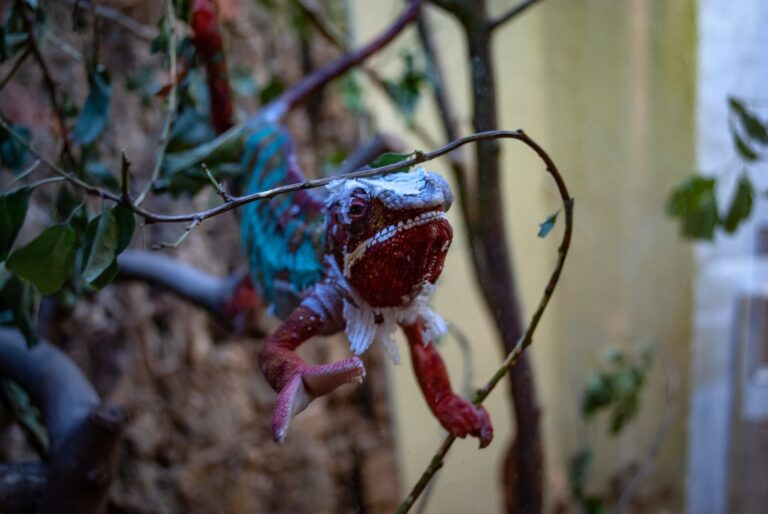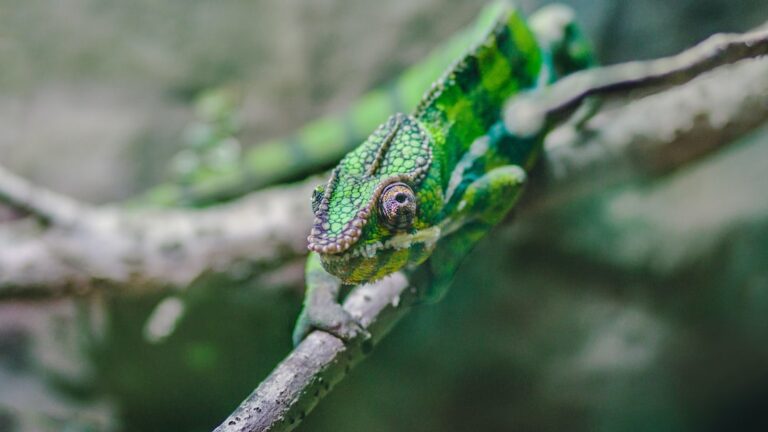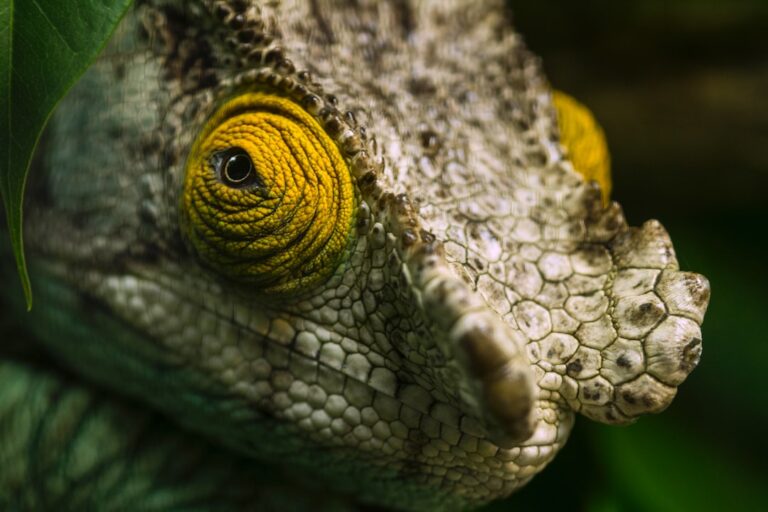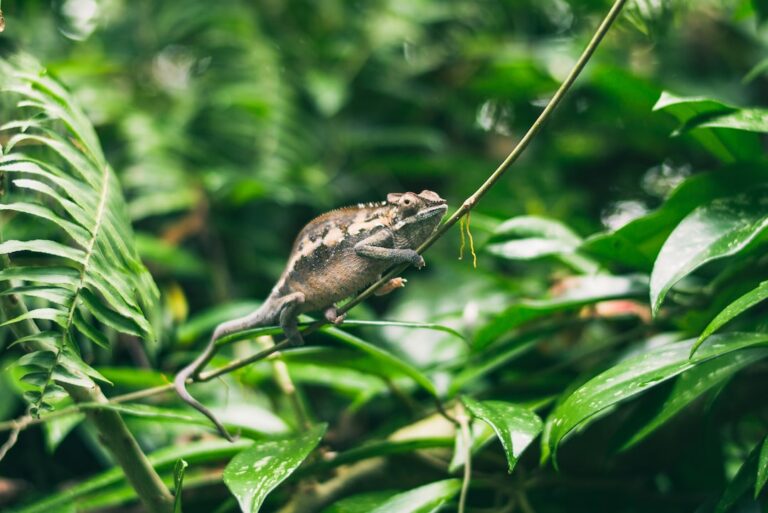Can Chameleons Eat Hornworms?
Chameleons are fascinating creatures known for their ability to change color and blend into their surroundings. They are also known for their unique dietary needs. Chameleons are insectivores, meaning they primarily eat insects. In the wild, they feed on a variety of insects such as crickets, flies, and grasshoppers. However, in captivity, it can be challenging to provide a diverse diet that meets all of their nutritional needs.
This is where hornworms come in. Hornworms are the larvae of the hawk moth and are often used as a food source for reptiles and amphibians. They are highly nutritious and can provide chameleons with essential vitamins and minerals that may be lacking in their regular diet.
Table of Contents
Nutritional Value of Hornworms for Chameleons
Hornworms are packed with nutrients that can benefit chameleons. They are high in protein, which is essential for growth and muscle development. They also contain calcium, which is crucial for maintaining strong bones and preventing metabolic bone disease, a common condition in captive reptiles.
In addition to protein and calcium, hornworms also provide chameleons with other essential vitamins and minerals such as vitamin A, vitamin C, and potassium. These nutrients are important for overall health and immune function.
When compared to other common chameleon foods such as crickets or mealworms, hornworms often come out on top in terms of nutritional value. While crickets and mealworms can be nutritious, they may not provide the same level of vitamins and minerals as hornworms.
Can Chameleons Digest Hornworms?
Chameleons have a unique digestive system that allows them to consume a wide variety of insects. Their digestive tract is designed to break down the exoskeletons of insects and extract the nutrients from their bodies.
Hornworms are relatively soft-bodied insects, making them easier for chameleons to digest compared to insects with harder exoskeletons. However, it is still important to ensure that the hornworms are an appropriate size for the chameleon. If the hornworms are too large, they may be difficult for the chameleon to swallow and digest properly.
Another potential issue with feeding hornworms to chameleons is their high moisture content. Chameleons are adapted to arid environments and may not be able to handle the excess moisture from hornworms. It is important to provide a balanced diet that includes a variety of insects to ensure that the chameleon’s nutritional needs are met.
How to Feed Hornworms to Chameleons
Feeding hornworms to chameleons is relatively straightforward. The first step is to ensure that the hornworms are of an appropriate size for the chameleon. They should be no larger than the width of the chameleon’s head to prevent choking or digestive issues.
Hornworms can be purchased from pet stores or online suppliers. They are typically sold in containers with a food source, such as tomato leaves or a special hornworm diet. It is important to provide fresh food for the hornworms and remove any uneaten portions regularly.
To feed the hornworms to the chameleon, simply place them in a feeding dish or release them into the chameleon’s enclosure. Some chameleons may prefer to hunt their food, so it can be beneficial to let the hornworms crawl around the enclosure for the chameleon to catch.
It is important not to overfeed the chameleon with hornworms or rely solely on them as a food source. Variety is key when it comes to a chameleon’s diet, so it is recommended to offer other insects such as crickets, mealworms, and roaches in addition to hornworms.
Precautions to Take When Feeding Hornworms to Chameleons
While hornworms can be a nutritious addition to a chameleon’s diet, there are some precautions that should be taken. One potential risk is the size of the hornworms. As mentioned earlier, they should be an appropriate size for the chameleon to prevent choking or digestive issues. If the hornworms are too large, they can cause blockages in the chameleon’s digestive tract.
Another potential risk is the moisture content of the hornworms. Chameleons are adapted to dry environments and may not be able to handle the excess moisture from hornworms. This can lead to digestive issues such as diarrhea or dehydration. It is important to provide a balanced diet that includes a variety of insects to ensure that the chameleon’s nutritional needs are met.
To minimize these risks, it is recommended to offer hornworms as part of a varied diet rather than as the sole food source. This will ensure that the chameleon receives a balanced mix of nutrients and reduce the likelihood of overfeeding or digestive issues.
Other Food Options for Chameleons
While hornworms can be a beneficial addition to a chameleon’s diet, they are not the only option. There are several other insects that can be fed to chameleons to provide a diverse and nutritious diet.
Crickets are one of the most common food sources for chameleons. They are readily available and provide a good source of protein. However, they may not provide the same level of vitamins and minerals as hornworms.
Mealworms are another option for chameleons. They are high in protein and fat, making them a good choice for growing chameleons or those that need to gain weight. However, they should be fed in moderation as they can be high in phosphorus, which can interfere with calcium absorption.
Roaches are becoming increasingly popular as a chameleon food. They are high in protein and low in fat, making them a nutritious option. They also have a softer exoskeleton compared to crickets, making them easier to digest.
Benefits and Risks of Feeding Hornworms to Chameleons
Feeding hornworms to chameleons can have several benefits. They are highly nutritious and provide essential vitamins and minerals that may be lacking in a chameleon’s regular diet. They are also relatively easy to digest, making them a good choice for chameleons with sensitive digestive systems.
However, there are also some potential risks associated with feeding hornworms to chameleons. As mentioned earlier, the size of the hornworms can be a concern. If they are too large, they can cause choking or digestive issues. The high moisture content of hornworms can also be problematic for chameleons adapted to arid environments.
To minimize these risks, it is important to offer hornworms as part of a varied diet rather than as the sole food source. This will ensure that the chameleon receives a balanced mix of nutrients and reduce the likelihood of overfeeding or digestive issues.
Common Misconceptions About Chameleons and Hornworms
There are several common misconceptions about chameleons and their diets. One misconception is that chameleons only eat insects. While insects make up the majority of their diet, some species of chameleons also eat plant matter such as leaves and flowers.
Another misconception is that all insects are suitable for chameleons. While many insects can be fed to chameleons, not all are nutritionally balanced or safe for consumption. It is important to research and select appropriate insects that provide the necessary nutrients for chameleons.
Finally, there is a misconception that chameleons can survive on a single type of insect. While chameleons may have preferences for certain insects, it is important to offer a variety of insects to ensure that they receive a balanced diet.
Signs of Overfeeding or Underfeeding Chameleons with Hornworms
It is important to monitor a chameleon’s diet to ensure that they are receiving the appropriate amount of food. Overfeeding or underfeeding can lead to health issues and should be avoided.
Signs of overfeeding include weight gain, lethargy, and a decrease in appetite. If a chameleon is consistently overfed, it can lead to obesity and other health problems.
Signs of underfeeding include weight loss, decreased activity, and a lack of appetite. If a chameleon is consistently underfed, it can lead to malnutrition and weakened immune function.
If you notice any of these signs, it is important to adjust the chameleon’s diet accordingly. This may involve reducing or increasing the number of hornworms or other insects offered.
Hornworms as a Healthy Addition to Chameleons’ Diet
In conclusion, hornworms can be a healthy addition to a chameleon’s diet. They are highly nutritious and provide essential vitamins and minerals that may be lacking in their regular diet. However, it is important to offer hornworms as part of a varied diet rather than as the sole food source.
Feeding hornworms to chameleons should be done with caution, taking into consideration the size of the hornworms and the moisture content. It is also important to monitor the chameleon’s diet and adjust accordingly to prevent overfeeding or underfeeding.
Overall, hornworms can be a beneficial addition to a chameleon’s diet when fed in moderation and as part of a balanced meal plan. By providing a variety of insects and ensuring that the chameleon’s nutritional needs are met, you can help promote their overall health and well-being.
If you’re curious about the eating habits of chameleons, you may also be interested in learning why chameleons eat their shed skin. Shedding is a natural process for reptiles, including chameleons, and it serves several important purposes. To find out more about this fascinating behavior, check out this informative article on reptilefriend.com.


